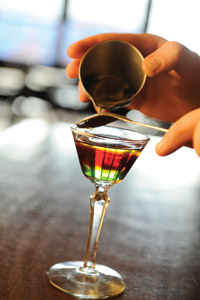When Sausalito-based art dealer Richard Polsky released his memoir, I Sold Andy Warhol (Too Soon), last year, he was telling readers the market was close to hitting bottom and would begin its inexorable climb upward as the economy brightened.

The secret to making a perfect pousse-café is all about the specific gravity of the spirits. Photo courtesy of the Exploratorium
By Paul Duclos
Published: January, 2011
When Sausalito-based art dealer Richard Polsky released his memoir, I Sold Andy Warhol (Too Soon), last year, he was telling readers the market was close to hitting bottom and would begin its inexorable climb upward as the economy brightened. He appears to have been correct regarding the reversal of domestic fortunes, and one wonders if he is now working on a new epilogue for a revised edition. Having devoured this book and its predecessor (2003’s I Bought Andy Warhol), I certainly hope so.
In candid and acerbic detail, Polsky reveals all that he knows of the local gallery scene, and the small extent to which it impacts the art world epicenter of New York. Collectors who were lured into the bidding frenzy of the “bubble” years suffered the much the same fate shared by investors in real estate and hedge funds, and many of them were forced to sell works at a loss to escape insolvency. Polsky is sympathetic to their plight, but at the same time explains how mass hysteria was fueled by the predatory guile of gallerists in the past decade.
While the general tone of the book is one of tired cynicism, the author is clearly still passionate about buying “with your gut” when a piece moves you. He reflects on just such a personal moment, describing the discovery he made when visiting a Tucson gallery specializing in Plein Air landscapes. There, he became acquainted with the painter, Bill Anton—a name hardly in the same class as the mega-auction artists he generally deals with. Yet, he had to have this work, and he makes a good case for all collectors to take a chance when a transcendent moment strikes. www.polskyartlog.blogspot.com
Polsky and other dealers build a strong case for research before entering into the speculative collecting dodge too. For many of us who favor works on paper, rather than paintings, that may mean becoming a member of the Achenbach Graphic Arts Council. This affiliate of the Legion of Honor and the De Young serves as the support council for the Achenbach Foundation for Graphic Arts (AFGA). The Council provides financial support assisting the AFGA with new acquisitions for the museum collection; sponsorship of graduate student fellowships; publishing of exhibition catalogues; and special events.
The AGAC office and the world-renowned collection of the AFGA are located in the Legion, offering an extensive graphics reference library and computerized collection database, including digitized images—all available to members by appointment.
On a recent visit, we came across an engraving of William Hogarth’s “A Rake’s Progress.” This is a chilling picture of dissipation and want, that even the most hardy partier would take to heart. www.achenbach.org
A less sobering lesson, but one just as engaging, may be evident at “The Science of Cocktails,” the Exploratorium’s January 26 fundraising event. As last year, the museum will be transformed into a laboratory of libations featuring drinks made by some of the Bay Area’s most celebrated mixologists and artisan distillers Lance Winters and Dave Smith from St. George Spirits will talk about the art and science of their craft.
According to Exploratorium spokespeople, Ethan Terry and the crew from Cocktail Lab will conduct lessons in the ultimate quaffing experience. “As you tour the different bars, sampling hors d’oeuvres along the way, you’ll have a chance to participate in a number of hands-on activities and help judge the Cocktail Mix-Off Competition. Learn how igniting citrus oils alters the flavor of a drink, or how French perfume-making techniques have changed the face of infused liquors. Want to know the trick to a perfect pousse-café? It’s all about the specific gravity of spirits.”
Tickets, priced at $120, can be purchased at www.exploratorium.edu.


